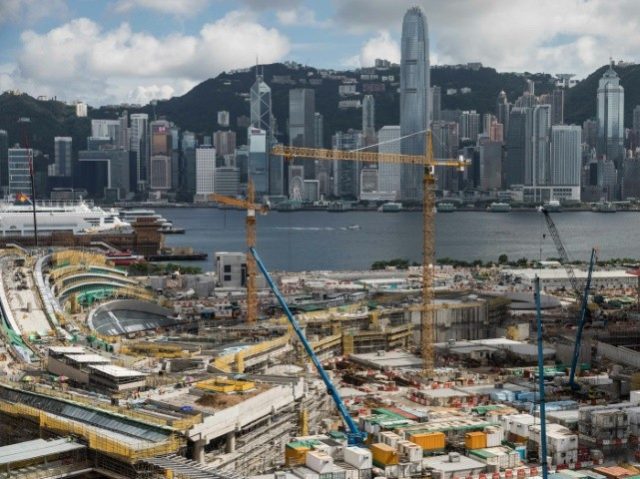The Hong Kong Bar Association declared itself “appalled” on Friday by the Chinese parliament’s order to enforce mainland Chinese law inside a Hong Kong rail station, warning that the move would “severely undermine” the rule of law and rattle public confidence in Hong Kong’s “one country, two systems” state of pseudo-independence.
At issue is the Guangzhou-Shenzhen-Hong Kong Express Rail Link, a high-speed rail service whose Hong Kong stop is the West Kowloon Terminus. The new service, which will come online late next year, is expected to be about twice as fast as existing rail travel between Hong Kong and the mainland city of Guangzhou.
The National People’s Congress in Beijing voted on Wednesday to make part of the station subject to mainland laws, particularly immigration rules. The idea was to check passengers into China at the Hong Kong station, rather than making them leave the train and go through immigration procedures after the train passes over the border between Hong Kong and mainland China.
The rules were presented as a convenience to passengers, but the Chinese legislature raised hackles in Hong Kong by declaring it “appropriate” that the relevant portion of the Hong Kong train station be “regarded as belonging to mainland China.” This was seen as a direct violation of Hong Kong’s Basic Law, which states clearly that mainland laws do not apply.
The Chinese legislature wants the infraction ignored because it applies to such a small area, is directly related to mainland China’s legal concerns, and is intended to make the rail line more convenient for travelers.
“Setting up a Mainland Port Area inside the West Kowloon station does not change the administrative area of the Hong Kong Special Administrative Region, does not affect the HKSAR’s right to a high degree of autonomy accorded by the law, does not reduce or harm residents’ rights and freedoms accorded by the law,” the congress said in a statement.
A parliamentary official added that if “Hong Kongers don’t feel comfortable, they can use another entry port and not take the high-speed train,” which might not have been the best approach to take from the standpoint of public relations with Hong Kong.
The Hong Kong Bar Association dismissed reassurances from the National People’s Congress Standing Committee on Friday.
“This plainly amounts to an announcement by the NPCSC that the cooperation agreement complies with the constitution and the Basic Law ‘just because the NPCSC says so,’” said the Hong Kong lawyers.
“Such an unprecedented move is the most retrograde step to date in the implementation of the Basic Law, and severely undermines public confidence in ‘one country, two systems’ and the rule of law. The integrity of the Basic Law has now been irreparably breached,” the Bar Associated judged.
The government of Hong Kong officially disputed the Bar Association’s claim that the train station ruling was a “retrograde move in the implementation of the Basic Law.” Many government officials are reportedly sympathetic to Beijing’s argument that putting part of the train station under mainland immigration law is the most convenient approach for passengers. They compared the proposal to the arrangements made for rail travel between the United States and Canada or Britain and France.
“Critics say the proposal could lead to Hong Kongers being arrested on Hong Kong soil for actions which are legal here, but not in mainland China,” the BBC notes. “It also feeds into growing concern in recent years about Chinese encroachment into Hong Kong affairs, after the disappearance from Hong Kong of several people who sold books critical of the Chinese government, and the removal of several MPs who had protested against Beijing while being sworn in.”
The BBC additionally raises the interesting question of whether travelers would have to abide by mainland Chinese censorship restrictions on the Internet, which ban popular sites like Facebook and Twitter, while they are in the Chinese portion of the West Kowloon terminal.
A group of six influential lawyers registered their own objections to the train station edict on Wednesday, led by human rights lawyer Philip Dykes, who is making a bid for chairmanship of the Hong Kong Bar Council. Dykes’ challenge for leadership might be one of the major reasons why the Bar Association, which is governed by the Bar Council, spoke out against the transit plan.
“We couldn’t find any article in the Basic Law which says the NPC can make decisions that can even set Hong Kong’s law aside in a specific place like West Kowloon,” said Professor Johannes Chan Man-mn, former law dean of the University of Hong Kong and a member of Dykes’ group. “This was an important decision made without the Basic Law, or with it being overridden.”
The group issued a statement of concern that the train station rule could undermine the confidence of both local and international investors in Hong Kong’s independence and its commitment to the rule of law.
“The rule of law will be threatened and undermined if the clear meaning of the Basic Law can be twisted and the provisions of the Basic Law can be interpreted according to expediency and convenience,” they warned.

COMMENTS
Please let us know if you're having issues with commenting.